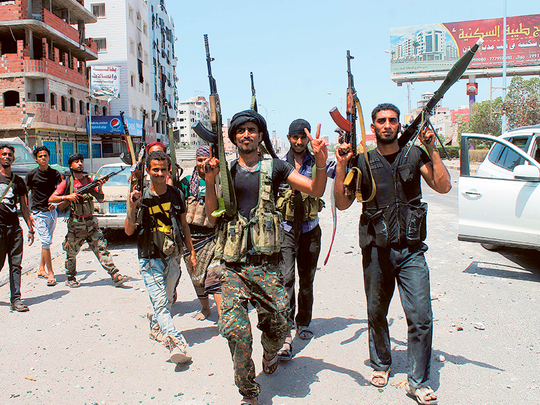
Cairo, Aden: A Saudi-led coalition struck northern provinces of Yemen on Saturday in a third consecutive night of heavy air strikes, Al Houthi rebels said, following their shelling this week of Saudi border areas.
More than 100 air strikes hit areas of Saada and Hajjah provinces, including the districts of Haradh, Maidi and Bakil Al Mir, Al Houthis said.
It was not possible to independently verify the number or location of strikes but coalition jets destroyed Al Houthi headquarters in Al Talah and tanks and military vehicles in Al Baqah in Saada province, Saudi state television reported.
Other strikes targeted Sana’a airport’s runway, an official there said, and Al Houthi targets in the Al Sadda district of Ibb in central Yemen, residents there said.
In the southern port city of Aden, clashes continued on Friday and Saturday in the central Crater, Khor Maksar and Mualla districts as Al Houthis and forces loyal to Saleh shelled local militias trying to oust them from the city.
However, Al Houthis were pushed back from parts of Dar Al Saad in the city’s north into Lahj Province, local militias send, and faced fighting in Al Dhala Province.
The coalition has bombarded Al Houthis and army units loyal to former president Ali Abdullah Saleh since March 26, but eased back on the strikes in late April and on Friday offered a five-day truce starting on May 12 if other parties agreed.
The Saudis and nine other Arab countries, backed by the United States, Britain and France, hoped to force Al Houthis back to their northern heartland and restore the exiled government of President Abd Rabbo Mansour Hadi, who is in Riyadh.
Al Houthis are mainly drawn from the Zaydi sect of Islam that predominates in Yemen’s northern highlands. They took advantage of political chaos to seize Sana’a and then advance further south over the past year, aided by Saleh.
Riyadh fears Al Houthis will act as a proxy for their main regional rival, Iran, to undermine Saudi security, and that their advance into non-Zaydi regions will add a sectarian edge to the civil war, strengthening Al Qaida in Yemen.
Iran and Al Houthis deny there are funding, arming or training efforts by Tehran, and regional analysts say the rebel group is unlikely ever to become an all-out proxy for the Islamic Republic in the mould of Lebanon’s Hezbollah.
Iran’s President Hassan Rouhani on Saturday said the campaign was the work of an “inexperienced” government that did not understand the region’s politics.












